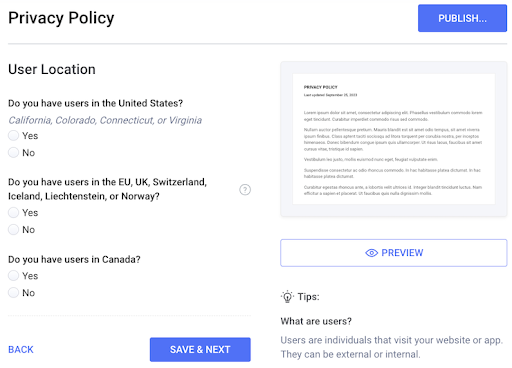Whether you are a personal trainer, fitness coach, or workout influencer, a fitness website is a great way to advertise your business and show how you help people live healthier lives.
However, if you collect personal information from your visitors, several privacy laws may require you to have a privacy policy on your fitness website.
In this guide, learn how to make a privacy policy for your fitness site, what goes into one, the laws that might impact it, and more.
- Creating a Fitness Site Privacy Policy
- What Is a Privacy Policy?
- Which Privacy Laws Affect Fitness Websites?
- Does Your Fitness Website Legally Need a Privacy Policy?
- What Are the Benefits of Having a Privacy Policy on Your Fitness Website?
- What Should You Include in Your Fitness Website’s Privacy Policy?
- Where To Display Your Fitness Site’s Privacy Policy
- Summary
Creating a Fitness Site Privacy Policy
You can easily make a privacy policy for your fitness website using a policy generator, a free template, or writing it yourself.
Use a Privacy Policy Generator
The simplest way to make a privacy policy for your fitness website is to use Termly’s free Privacy Policy Generator.
Our comprehensive solution asks easy questions about your business and helps you comply with applicable laws.
It then generates a unique policy based on your answers that you can embed directly on your site, taking all the hassles and guesswork out of data privacy compliance.
See what it looks like in the screenshot below.

Use a Template
You can also use our privacy policy template to customize a policy for your fitness website.
It includes the necessary clauses to comply with different data privacy laws — all you need to do is fill in the blank sections with information about your business.
If a clause doesn’t apply, remove it before choosing how to embed the policy on your website.
Write It Yourself
You can also write a privacy policy on your own, but this is only recommended if you have extensive knowledge about data privacy laws and how they impact your fitness site.
You could be held financially accountable if you leave something out and accidentally violate a privacy law.
But if you have a background in data privacy and want some additional help, check out our guide on how to write a privacy policy.
What Is a Privacy Policy?
A privacy policy is a legal document informing users how an organization uses and handles the personal data it collects from them, including:
- What data is collected
- How and why the data is used
- If the data is shared with third parties
- What rights users have over their data, and how to act on them
- Company contact information
Also called a privacy notice or a privacy statement, a privacy policy is an agreement between an organization and its users and typically must meet legal guidelines.
Which Privacy Laws Affect Fitness Websites?
Several privacy laws around the world require you to have a privacy policy on your fitness website, including the following:
- General Data Protection Regulation (GDPR)
- California Consumer Privacy Act (CCPA)
- California Online Privacy Protection Act (CalOPPA)
- Colorado Privacy Act (CPA)
- Virginia Consumer Data Privacy Act (VCDPA)
- Utah Consumer Privacy Act (UCPA)
Some laws, like the GDPR, apply based on your location and where your users come from.
Others, like the CCPA, apply if you meet certain monetary and data collection thresholds.
While each outlines slightly different business requirements, they all require you to present users with a privacy notification (aka privacy policy) to adequately inform them about how you process and use their data.
Does Your Fitness Website Legally Need a Privacy Policy?
Your website legally needs a privacy policy if it falls under any data privacy laws that require you to publish one.
But if you rely on any third-party applications, like Google Analytics or Ads, you must post one as part of their terms of use agreement even if no laws apply to your fitness site.
Website users want to feel secure before providing their personal information online.
Having a privacy policy is a great way to show your users your commitment to protecting their privacy, which helps build trust and foster brand integrity with users.
What Are the Benefits of Having a Privacy Policy on Your Fitness Website?
Having a privacy policy on your fitness website benefits your business in the following ways:
What Should You Include in Your Fitness Website’s Privacy Policy?
When creating your website’s privacy policy, you should include several key elements that I’ll cover in the following sections.
Introduction
All privacy policies need an introduction section.
Here, name your fitness business, explain who the policy applies to, define all relevant terms, and include a table of contents to help readers navigate the rest of your policy.
What Data You Collect
Your privacy policy should clearly explain all types of personal information collected from your users, which might include:
- Names
- Physical addresses
- Locations
- Email addresses
- Social media handles
- Credit card information
Make it easy to read and understand by putting this information in a table or a bullet list.
How and Why You Use the Data
Your privacy policy should let your users know how and why you collect personal data and what you do with it.
These reasons might include:
- To notify users about a product or service
- Send emails
- Process payment orders
If you fall under laws like the GDPR, you must prove a specific legal basis for collecting and using the data.
Children’s Data
You must explain in your fitness website privacy policy if you collect personal data from children or not.
If so, you’re subject to following laws like the Children’s Online Privacy Protection Act (COPPA).
Data Sharing With Third-Parties
Your privacy policy must explain if you share personal data with any third parties, including services like Google Ads and Oracle.
Under laws like the CCPA, you must also note why you sell or share information with them.
Data Retention
Under laws like the GDPR, your privacy policy must explain how long you plan to retain the data you collect from users.
Data Storage and Protection
Your privacy policy should explain how you plan to keep users’ data safe.
Indicate the security measures to store and protect the data from unauthorized access.
Data Security and Safety Measures
Laws like the CCPA and the GDPR require you to explain what safety and security measures you implement to protect personal data from unauthorized access.
Include this information as a clause in your fitness website’s privacy policy.
Your Use of Internet Cookies
Under privacy laws like the GDPR and the CCPA, cookies qualify as personal information.
You must include a clause in your privacy policy explaining if your fitness website uses internet cookies and for what purposes.
Users Rights Over Their Data
Most privacy laws require you to explain what rights your users have over their personal data and how they can act on those rights.
If more than one law applies to you, make separate clauses for each one so it’s easy for users to find the proper information.
Consider adding a Data Subject Access Request (DSAR) form to your website to make it easy for users to submit privacy requests.
Updates to Your Policy
Explain in a specific clause how you’ll communicate with your users about changes and updates to your privacy policy.
For example, you might send them an email, maintain archival copies of old versions of your policy, or include a last updated date somewhere on the document.
Under laws like the CCPA, you must update your policy at least once every 12 months.
How You Handle International Data Transfers
Laws like the GDPR require you to explain in your privacy policy how your website handles international data transfers.
You can typically only transfer data to countries with similar levels of protection as the privacy laws that protect your users, but in some cases, you can use standard contractual clauses.
Contact Information
Make sure you put your company contact information in your privacy policy so users know who to contact if they have any questions or concerns.
Include a working email address, phone number, or physical address.
Where To Display Your Fitness Site’s Privacy Policy
You should display your fitness website’s privacy policy in the following locations:
A good tip is to link to your privacy policy in multiple places wherever your website or app collects personal data from users, like when they sign up for an email newsletter.
Summary
Fitness websites often collect personal information from visitors, so you must post a comprehensive privacy policy to meet applicable legal requirements and keep your consumers adequately informed.
You might collect data from users when they create an account on your website, sign up for newsletters, or make a purchase.
Laws like the GDPR and CalOPPA don’t have any monetary or data collection thresholds, so they may apply to your site.
Use our free Privacy Policy Generator to easily make a privacy policy for your fitness website.


